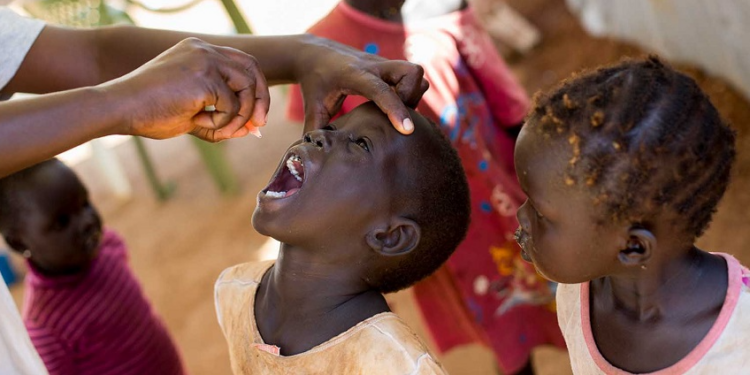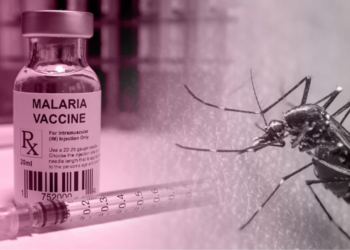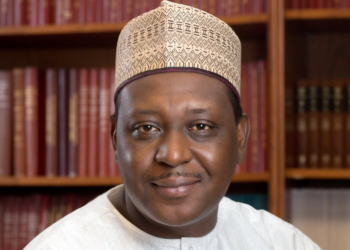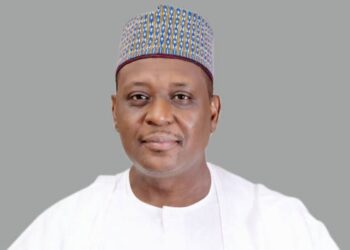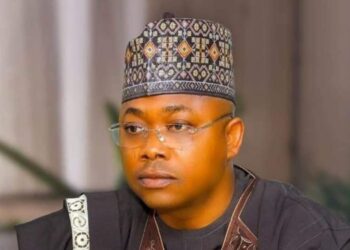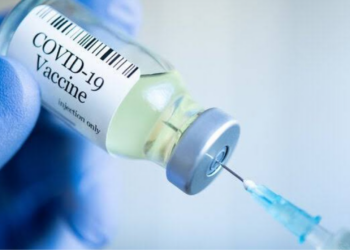The National Primary Healthcare Development Agency (NPHCDA) reports that Nigeria has recorded a 46% decline in circulating poliovirus cases compared to last year, indicating progress in eradication efforts.
The announcement was made on Tuesday in Abuja during the Second Quarter 2025 review meeting of the Northern Traditional Leaders Committee on Primary Health Care Delivery (NTLC), chaired by the Emir of Argungu, Alhaji Sa’Maila Muhammad Mera.
Dr Muyi Aina, Executive Director/Chief Executive Officer (ED/CEO), NPHCDA, said that the reported poliovirus cases had declined from 78% recorded last year to 46% as of today.
He noted remarkable progress in high-burden states, with cases declining by 85% in Kano and 84% in Katsina.
“Between April and June 2025, over 71% of planned settlements were reached during campaigns, rising to 78% in June, while vaccination coverage also increased from 81% to 84%,” Aina explained.
The NPHCDA boss called for stronger collaboration with the media to sustain progress, stressing that time was running out.
“We don’t want to be caught unprepared. This is why we are calling on the media to complement the efforts of our traditional leaders. We are also a voice of the people, and time is not on our side,” he said.
Persistent challenges undermining progress
Aina also addressed persistent challenges including fake finger-marking and insecurity, which he said undermined the credibility of the campaigns.
“When vaccinators are appointed from Abuja or state capitals, the community does not know them, and there’s no accountability.
“But when traditional leaders are involved in the selection, it improves trust and compliance,” he explained.
He emphasized that providing accurate information to parents remained critical, as no mother would knowingly endanger her child.
Traditional leaders urged to step up
In his welcome remarks, the Emir of Argungu, Alhaji Sa’Maila Muhammad Mera, urged members to intensify their efforts, stressing that the final stretch in the fight against poliovirus was often the toughest.
“We must not relent in our commitment to stopping the transmission of cVPV2 in our Emirates and Kingdoms. It is indeed a sacred duty we owe our people whom Almighty Allah has placed under our care,” he said.
Mera also highlighted the challenges in the uptake of other integrated services during vaccination campaigns, pointing to the low acceptance of HPV vaccines and anti-malaria interventions in some areas.
He called on traditional leaders to step up efforts to educate communities, reassure caregivers, and mobilize households to embrace all vaccines.
“We must redouble our efforts to educate our communities, reassure caregivers, and encourage households to embrace vaccination, as vaccines work,” he stressed.
The Emir further commended NPHCDA and its partners for introducing a strategic shift in vaccination campaigns and welcomed Gavi’s support for intensified community sensitization.
“This support is a clear attestation of the confidence and trust the global community has in the NTLC,” he added.
More insights
UNICEF Nigeria Country Representative, Ms. Wafaa Saeed-Abdelatef, expressed optimism that Nigeria was nearing the final stretch of polio eradication.
“We are hopeful that we are now at the final stretch in Nigeria, and also globally,” she said.
However, she warned that nomadic and other mobile populations, characterized by frequent movement and limited access to healthcare services, continue to pose a challenge to polio eradication efforts, alongside other issues such as water and sanitation.
Saeed-Abdelatef emphasized the critical role of traditional rulers in breaking transmission in the Lake Chad region, where cultural and linguistic ties extend across 17 countries.
She also called for their support in the upcoming integrated measles, rubella, and polio vaccine campaign, which will introduce a new vaccine into Nigeria’s routine immunization programme.
Saeed-Abdelatef confirmed that progress in primary healthcare revitalization, noting that over 1,160 facilities have been upgraded nationwide, with another 2,800 in the process of being equipped.
“More than 54,000 zero-dose children were reached last year, and 774 health fellows have been deployed to strengthen local-level service delivery,” she said.
According to her, traditional leaders’ engagement remains central to vaccination successes, ensuring supervision, accountability, and improved compliance among caregivers.
She added that with sustained collaboration among government, communities, media, and traditional institutions, Nigeria can finish strong in its race to eliminate the virus.

